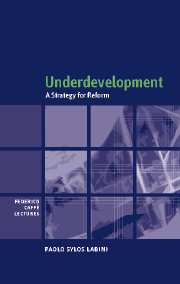Book contents
- Frontmatter
- Contents
- List of figures and tables
- Introduction
- 1 Economic development in a secular perspective
- 2 Culture, institutions and resources
- 3 The inadequacy of mainstream economics to explain development processes: returns and prices
- 4 The inadequacy of mainstream economics to explain development processes: distribution and growth
- 5 Economic relations between developed and underdeveloped countries
- 6 Demographic pressure and the countries of increasing poverty
- 7 Dependent workers, employment and unemployment
- 8 Organizational and institutional innovations
- 9 The problem of corruption
- Conclusion: a strategy for reform
- Bibliography
- Index
Conclusion: a strategy for reform
Published online by Cambridge University Press: 22 September 2009
- Frontmatter
- Contents
- List of figures and tables
- Introduction
- 1 Economic development in a secular perspective
- 2 Culture, institutions and resources
- 3 The inadequacy of mainstream economics to explain development processes: returns and prices
- 4 The inadequacy of mainstream economics to explain development processes: distribution and growth
- 5 Economic relations between developed and underdeveloped countries
- 6 Demographic pressure and the countries of increasing poverty
- 7 Dependent workers, employment and unemployment
- 8 Organizational and institutional innovations
- 9 The problem of corruption
- Conclusion: a strategy for reform
- Bibliography
- Index
Summary
Revolution and reform
‘The sleep of the reason breeds monsters.’ But the trouble is not with sleeping reason, but with ends – the ends chosen by intellectuals and political leaders, who in certain countries were able to seize power after convincing a good number of their people that those ends were worth pursuing at all costs; as a rule, the means adopted were fully rational. In fact, the systems of ideas – the ideologies – of those intellectuals and of those leaders had some of the characteristics of a religious faith. This is true in the case of Karl Marx, who preached the necessity of a proletarian revolution by arguing – and this is one of his great responsibilities – that the civilized way of reform to solve social problems, even the most difficult ones, was largely impracticable. His other great responsibility was his formula ‘the dictatorship of the proletariat’, which was based on an imperfect analysis and was used to make the most ruthless dictatorships intellectually respectable. The right-wing Nazi ideology, too, was a kind of faith, even if Adolf Hitler's cultural level was significantly more modest than that of Karl Marx (Mein Kampf is in no way comparable with Das Kapital). Hitler preached that the historical task of the Germans, as members of a superior race, was to dominate the world, eliminating the inferior races – in a mass ethnic cleansing – or transforming them into slaves.
- Type
- Chapter
- Information
- UnderdevelopmentA Strategy for Reform, pp. 183 - 198Publisher: Cambridge University PressPrint publication year: 2001



